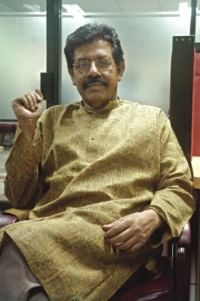The Art of Words

Mohammad Rafiquzzaman
The romantic young lyricist Mohammad Rafiquzzaman was in for a surprise when his very first song was chosen for the prestigious “E-masher Gaan” on Radio. The programme centring on leading artistes, was aired four times a week on Radio Bangladesh. Four eminent singers Ferdousi Rahman, Anjuman Ara Begum, Abdul Hadi and Monu De rendered that particular song, and Rafiquzzaman received a rousing response from his peers. Noted music director Azad Rahman had composed the song.
Back in 1965 this was undoubtedly a turning point for the budding lyricist Rafiquzzaman, hardly in his early 20's at that time. “Recognition of such magnitude for the song “Mugdho amar ey chokh jokhon, mukhdho amar e mon”, among the music connoisseurs was a catalyst to draw me closer to the world of lyrics and it soon became an inseparable part of me,” says a soft-spoken Rafiquzzaman.
Among the 1,000 plus songs that have created ripples such as, “Amar Mon Pakhita Jai re Urey”, “Amake ekti doyel bolechhey” by Runa Laila; “Paharer kanna dekhe” by Subir Nandi and countless hits by Sabina Yasmeen such as “Jodi moroner porey keo proshno korey”, “Tumi eshechho bohudin por”; “Shobai boley joto shorbonasher muul” by Nargis Perveen; “Amar baul moner ektara ta” a duet by Rafiqul Alam and Shammi Akhter and more ---it would not be an overstatement to say that Rafiquzzaman is the most accomplished among the contemporary lyricists.
A student of literature, Rafiquzzaman was irresistibly drawn to music. Like most amateur writers, Rafiquzzaman had penned his first lyric, a parody, for a college function in 1961. He was then studying at his hometown in Jessore. Soon he joined Bangladesh Betar and set sail on his journey to the world of timeless songs.
A nostalgic Rafiquzzaman recalls the golden days of music. “The talented Abu Zafar was my contemporary. My elder brother Dr. Mohammad Muniruzzaman; Professor Abu Hena Mustafa Kamal; Abul Hayat Mohammad Kamal and Fazle Khuda were already noted personalities in the music circuit as lyricists when I started,” he continues.
Famous composers Abdul Ahad, Sattya Shaha, Dhir Ali, Khondokar Nurul Alam, Azad Rahman and others created timeless gems that remain unmatched.
"Film songs are situational," adds the accomplished lyricist. "It is a combined effort of the lyricists, music composers, artistes, musicians and the recordists. We would spend hours together with the music composers and the artistes would sit for regular rehearsals before a song was created.
“Many of my songs, going by their popularity, such as “Dukhkho amar bashor rater palonko”, by Sabina Yasmeen; “Bondhu hotey cheye tomar shotru boley gonno holaam” by Subir Nandi, “Eto shukh shoibo kemon korey” by Nilufar Yasmeen were included as playbacks.
Rafiquzzaman was awarded the BACHSAS and National Award for lyrics for “Tumi emoni jaal petechho shongshar-e” (film Shubhoda) sung by Subir Nandi; “Jonom Jonom dhore prem piyashi” sung by Sabina Yasmeen( film Debdas); and “Phuler bashor bhanglo jokhon” sung by Probal Chowdhury (film Chandranath).
Apart from scriptwriting in movies and directing quite a few films, Rafiquzzaman has penned a book on the technique of lyric writing, titled “Adhunik Bangla Gaan Rochonar Kolakoushal”. The book was published in 2008 at the Ekushey Boi Mela.
Rafiquzzaman conducts a special evening programme on Bangladesh Betar, albeit infrequently. The show is broadcast twice a week on Thursdays and Saturdays, and has been broadcast for the last 20 years. In the 30-minute programme, he concentrates on the queries of the upcoming talents, about the technique of writing songs. He discusses at length the choice of words, the importance of meter in songs and more.
And that is not all---now listeners might tune in to the three- hour show currently aired live from radio ABC on Saturdays from 12 pm(noon) in which he communicates with the new generation lyricists.
Rafiquzzaman is not totally disheartened about the contemporary writers but stresses that the onus falls on both sides. “We have distanced ourselves from them, and so have they. This has inevitably created a gap in the field. If only we nurture the latent talents we would be able to create a new generation of song writers”.
"In our country the lyricists become a forgotten chapter when a song becomes a classic," notes Rafiquzzaman. “ I detest the word “geetikaar”; “kaar” in Bangla refers to the word “whom”? To me it distances the poet from his creativityI prefer the word “geetikobi”, which is musical on its own,” he adds with a smile, " and ties in the lyricist with his work in a close bond".
"Once we appreciate the meaning of the word geeti-kobi, and get the right inspiration, lyricists will once again be proud to have their name associated with at least one timeless piece of work in their lifetime, rather than a thousand one-day hits," he says.

 For all latest news, follow The Daily Star's Google News channel.
For all latest news, follow The Daily Star's Google News channel. 



Comments